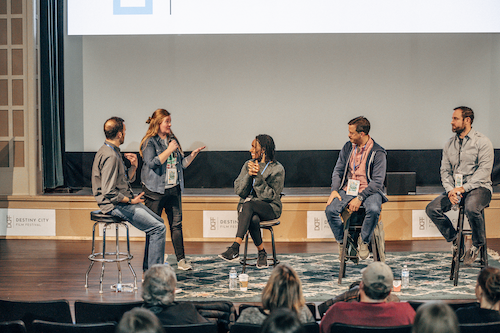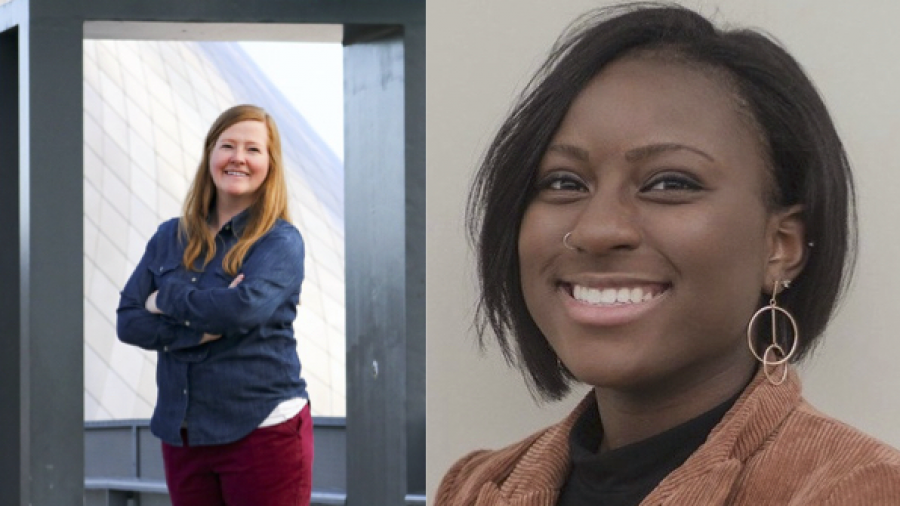Written by Jonah Azurin
Founder & Executive Director Emily Nakada-Alm and Marketing Coordinator Ambriehl Turrentine of Destiny City Film Festival (DCFF) talk with Jonah Azurin about the origin of DCFF, virtual programming, and their community involvement in Tacoma, Washington.
How did Destiny City Film Festival get started?
Emily: I founded DCFF back in 2013 and had our first festival in 2014. I had worked for a number of festivals in and around Tacoma while I was in college and after [I graduated]. Then, I ran the Tacoma Film Festival for a few years and was excited to break out and grow some wings. That’s when I founded DCFF. I really believe that there are so many amazing independent films out there so the more film festivals we have, the better. We can share stories and bring more richness to the culture in our community-that’s why I founded the festival. We really focus on storytelling, celebrating that as a craft and how that goes into making a movie from start to finish. That’s what we continue to do every year.
Would you say that aligns with your core mission?
Emily: Absolutely. We like to partner with other organizations as much as we can whether that be through sponsorship, co-presenting events, or co-promotion; anyway we can collaborate makes it that much better.
How did you get involved with film festivals and/or the arts?
Emily: I’m originally from Colorado, came to Tacoma, Washington to go to college, and ended up loving it. I’ve been here almost 17 years and after I graduated with a degree in Communication Studies, I immediately started working in indie movie films, indie movie theaters, and in nonprofit arts. That’s how I got my foot in the door and I fell in love with it. The [arts] scene here in Tacoma and in the Northwest is so unique compared to other places. There’s a lot of creativity running throughout our community and it’s really inspiring.

Image from a previous Destiny City Film Festival event.
Ambriehl: I’m from Fort Worth, Texas but I lived in Missouri for four years while I attended the University of Missouri. After I graduated, I moved to Los Angeles, California and worked for the Academy [Awards]. I had a great time there and then came back to the Dallas-Fort Worth area. My passion for film festivals started from when I went to school in Missouri. Columbia, Missouri is a small college town and the film community is really tight-knit as well as the entire arts community there. They have a film festival and a small independent theater – right next to a record shop – that do a lot of collaborating with each other and the university. Eventually I was like, “Hey! I want to get involved.” So I got involved and the rest is history.
How are you keeping your DCFF audience engaged?
Emily: We were able to have our seventh annual film festival in February 2020, right before things started shutting down. I’m really grateful that we finished the festival because we had some time afterwards and didn’t have to think about what we were going to do [had the festival happened later in the year]. It gave us plenty of time to see what the other film festivals were doing, what are the opportunities, and what the challenges would be. Since we didn’t know what it’ll be like in February, last November we decided we’re just going to go virtual with the festival, select the dates, and just go for it. I definitely think it [was] the right decision. Last October, we partnered with a local venue that has restaurants, a stage, a coffee shop, and things to do outdoors so we had programming to view some free outdoor films. We were able to do free programming for families, which is really great because we provided the opportunity for the community to get out of the house and engage with the arts. Now we’re looking forward to the festival this February.
Ambriehl: One thing I really try to focus on is keeping filmmakers and the Tacoma arts community engaged as a whole. We’re doing a lot of spotlighting for filmmakers who have had their films play at our festival in previous years as well as local filmmakers in general. I am planning to reach out to local filmmakers so we can continue supporting them [and also inform them] about our presence as a resource. We continue to encourage the community to support [local filmmakers], too.
I try to keep up with the Tacoma area and arts community through an online presence, especially since I’m not there physically.
After filmmakers submit to your festival, what is the selection process like?
Emily: We have a panel of about ten to twelve folks, a group of volunteer film screeners. A lot of them are from the Western Washington area, some from other parts of Washington state, and we have some folks from different areas of the country. These folks have experience and background in film and a passion for it and sometimes film festival experience. Typically, I assign a group of films to each reviewer; I like to be flexible with their time and how much they take on. I don’t want it to be this big task to complete in a short amount of time so they can review them when they can and submit those forms to me. [Afterwards] I look at them and see what is rising to the top, what’s in the middle, look at the films that need another consideration. I’ll end up selecting the final slated films considering feedback from the screeners, . We usually try to hit different types of genres to reach different audiences. We keep the voices and perspectives diverse, and bring a wide variety of stories to the festival that people will learn from. We really look for films that make an impression on us, that we know can be inspirational and help build community because we believe that sharing those stories through film and coming together to watch, even virtually, can build community and connections between folks. That’s what we like to do each year.
What advice would you give to creatives during this difficult time?
Emily: I always believe that with any type of creation or artistry it’s important to take care of yourself, to really focus on something that you truly believe in, and see that all the way through. We all know that if you see a film that the filmmakers weren’t really into, it’s not gonna make that impact the way you want it to so really identify with what’s important to you and find those people out there who also support that project. Believe in those goals and collaborate. I think now collaboration, building community, and leaning on other people is super important and very beneficial. We want to share stories that make an impact and shed light on stories that you might not always hear; stories that are powerful, create positive change, and make people think. I applaud anyone who’s making films right now that create positive change and we want to be a part of that process.
Ambriehl: I fully agree with what Emily said. I would add that this is a difficult time for everyone to want to create so even though creating is super important, learning is a great step that leads to creation. Whether it be through music, film, or learning about yourself, other voices, and other cultures, that even if you’re not creating you continue to learn. Keep watching, keep reading, stay engaged and you’ll get to where you want to be.
Be sure to check out destinycityfilmfestival.com, use the hashtag #DCityFF2021 and follow DCFF on Twitter, Facebook, and Instagram.

